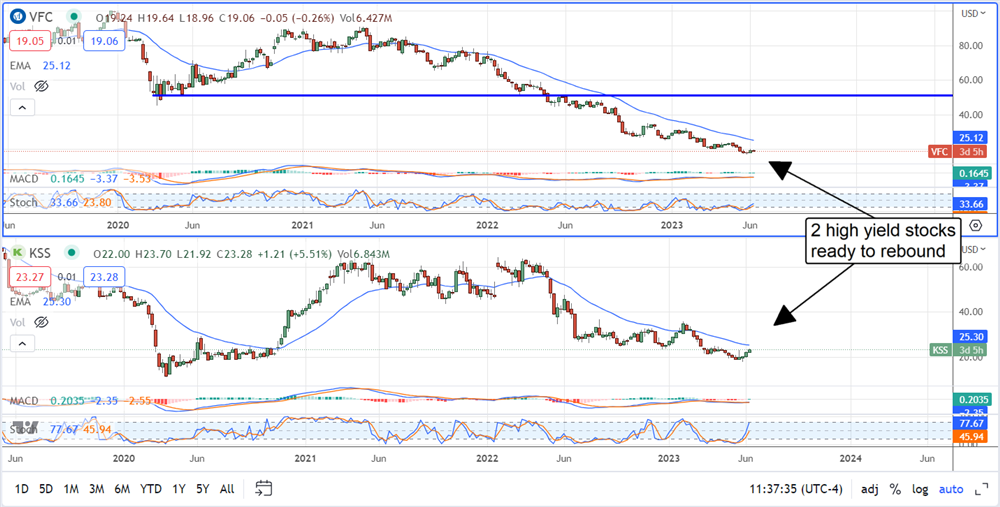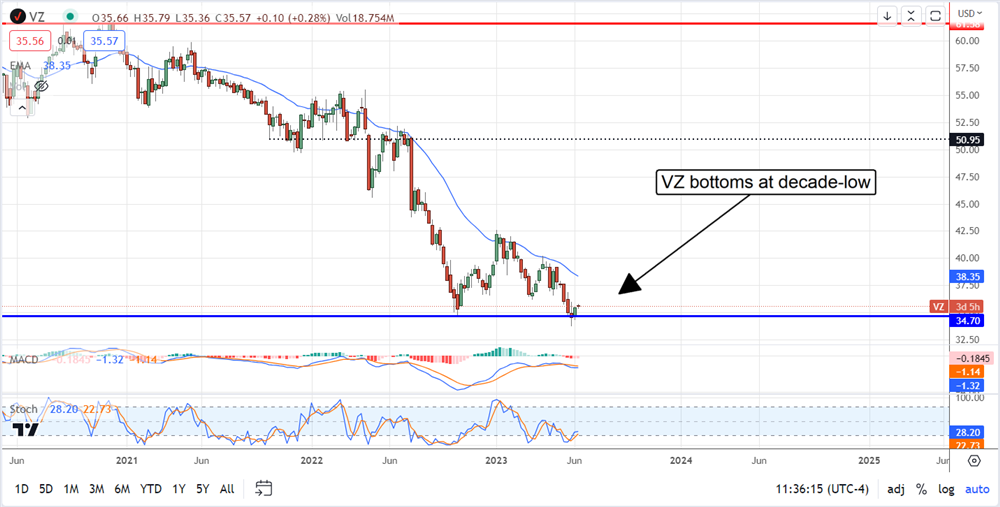
Value investing is the idea of buying high-quality stocks when they are cheap. The hard part about value investing is buying those stocks when they’re down. Usually, stocks are down for a reason, which is true for V.F. Corporation (NYSE: VFC), Verizon (NYSE: VZ), and Kohl’s (NYSE: KSS).
While all 3 markets have a reason to be down, the companies are still solid, and 2, V.F. Corporation and Kohl’s, are in the midst and on the verge of turning around their businesses. All offer high yields and show signs of bottoming, adding another element to the opportunity. These stocks average more than 7.o% in yield and offer upside potential not seen in most high-yield stocks supported by the sell-side.
V.F. Corporation Got Right-Sized
V.F. Corporation’s woes are centered on earnings weakness and a dividend that had increased yearly for nearly 50 years. The company was on track to hit Dividend King status, but the payment was too high to maintain. The company tried to correct the issue and failed; it tried again and made progress but still reached the point of no return.
The company cut the distribution early in 2023 and “right-sized it” relative to income and earnings. The last earnings report was not great, but it could have been worse, and the new dividend is in the safety zone.
VFC is paying $0.30 quarterly or $1.20 annually for a payout ratio of 57% compared to the consensus estimates. The outlook for the year has moved lower due to increased promotional activity, but even this has a silver lining. Inventory-clearing actions help set the company up for success when the rebound in discretionary spending commences.
Until then, the company has been outperforming its estimates and may continue to show strength and pay its 6.25% dividend yield. That’s why the sell side is holding. Twenty-one analysts Hold the stock and see it trading at or just below fair value with shares new $19. Institutions own about 97% of the shares and are also, on balance, holding the stock.
Kohl’s Turnaround Takes Hold
Kohl’s is suffering from some of the same and similar issues as V.F. Corporation, absent the need to cut the dividend. Although it was tough and go for a while, and there are still hurdles to cross, the company’s efforts to improve profitability are taking hold. That has brightened the dividend outlook, which includes an 8.5% yield. The payout is running high, but the latest report and outlook have led the market to believe it is sustainable.
The dividend is 85% of the 2023 EPS outlook and 68% of the 2024 outlook, with a chance for better-than-expected performance. Not only was the FQ1 report better than expected on the top and bottom lines the guidance leaves ample room for strength relative to the consensus. Additionally, the company’s inventory is down, and its capital position is stronger, giving it leverage in the operating environment. That means the ability to capitalize on deals to drive sales and earnings as they arise.

Verizon: Slow, Steady Growth, And 7.3% Yield
Verizon’s biggest issue is its sluggish and easily predictable growth which gives no cause for excitement. The opportunity is that shares are trading at a decade-low valuation and price point while yielding 7% with growth in the forecast. Earnings growth and dividend growth because Verizon is a well-known distribution-growing stock. The company is on track for the 19th consecutive annual increase and could easily reach Dividend Aristocrat status.
The analysts see the stock as a value. The lowest price target recorded on Marketbeat’s tracking page is $37, implying the stock is undervalued by at least 4.5%. That outlook is consistent with bottoming in the market that coincides with institutional buying. The takeaway is that Verizon’s 7% yield is attractive to the 3 important segments of the market; retail, analysts, and institutions.
